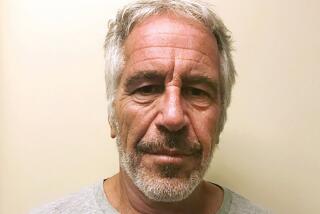U.S. on Guard as Annan Forges Links to Iraq
UNITED NATIONS — U.N. Secretary-General Kofi Annan is stirring concern in Washington by opening new avenues of communication to Baghdad in the aftermath of his visit to the Iraqi capital, diplomats and officials say.
The effect has been to ease Iraq’s status as a pariah nation within the world body and give the government of President Saddam Hussein a direct line to Annan for complaints about U.N. weapons inspectors, who hold the key to unlocking the tough economic sanctions imposed on the country.
Annan’s actions are being watched closely in Washington and within the U.N. In a worst-case scenario, it is feared they could undercut the authority of the inspectors and give Hussein a new platform for his campaign to get out from under the sanctions.
The Clinton administration, which publicly endorsed Annan’s Baghdad initiative, has worked behind the scenes to influence his actions since his return to New York.
In the latest development, U.N. officials confirmed Wednesday that Annan has selected a veteran Indian diplomat, Prakash Shah, 58, as his special representative in Baghdad. The appointment is expected to be announced officially by the end of the week. Shah’s job will be to “keep the secretary-general informed on the [Iraqi] government reaction to the various U.N. programs going on there,” U.N. spokesman Fred Eckhard said Wednesday.
But other sources described Shah as Annan’s political operative in Baghdad, whose principal job will be to “contain any political problems that might arise. . . . The secretary-general does not want small problems to blow up into major problems.”
In another sign of Iraq’s rising profile at the U.N., Annan will confer here next week with Iraqi Foreign Minister Mohammed Said Sahaf about expanding a key U.N. humanitarian program in Baghdad. Annan also has begun talking cautiously about the day when sanctions against Baghdad can be lifted and Iraq can “rejoin the family of nations.”
Sources here say Annan is seeking to consolidate what he sees as the gains of his Baghdad mission. He believes that the agreement negotiated there may represent a significant turning point for the Iraqi regime and that Hussein is prepared to be more cooperative with weapons inspectors than in the past. This is based largely on the fact that the Iraqi president himself agreed to the terms of the pact in a three-hour meeting with Annan.
In that meeting, Hussein backtracked from his vow to forever bar weapons inspectors from eight “presidential” palaces and their surrounding buildings and grounds. In return for Hussein’s reversal, Annan has assumed a bigger role in the relationship between the U.N. and Iraq.
“Now he’s being drawn into the political scene,” one U.N. official said of Annan. “He has an enormous stake in seeing that the agreement sticks, that Iraq implements it. And so does Iraq. If Iraq is seen as not implementing it, it may make it easier for the United States to get more international support for military action.”
The Baghdad accord calls for new procedures for arms inspections at the presidential sites, with the investigators being escorted by foreign diplomats. Earlier, Annan appointed Jayantha Dhanapala of Sri Lanka, the U.N. undersecretary-general for disarmament, to work with the diplomats, who are to be appointed by Annan.
Chief weapons inspector Richard Butler is supposed to retain control of the inspections despite the diplomatic presence; Butler and Annan have been working all week on how the process will be carried out. Those procedures, expected to be made public by Friday, will be scrutinized by the United States for signs that the inspection process has been compromised.
The U.S. suspects that the Iraqis might try to extend the system to other sites, use their new relationship with Annan to circumvent Butler and gradually erode the integrity of the system.
But the U.S. has signed off on the appointments of Dhanapala and Shah. One American official described Shah as “very tough-minded, very legalistic, a very independent player and very clearly nobody’s fool.”
One positive development of his appointment, in the U.S. view, could be another voice reporting on the excesses of the Iraqi government, the official said. “It’s our experience that the longer one is in Baghdad, the more one becomes disenchanted with the Iraqi regime,” he added.
A number of Annan aides who accompanied him to Iraq returned with doubts about the policy of sanctions and containment pushed mainly by the U.S. and Britain, U.N. sources say. In part, they were influenced by U.N. humanitarian workers in Iraq, who tend to view the sanctions as hurting the Iraqi people but doing little to loosen Hussein’s brutal hold on power.
Annan has never gone that far. While opening new channels to Baghdad, he also has endorsed the U.S. position of diplomacy backed by military force and has said it is now up to Iraq to meet the terms of the Baghdad agreement.
Under terms of the 1991 Persian Gulf War cease-fire, inspectors must certify that Iraq has eliminated its weapons of mass destruction before the Security Council can consider lifting the sanctions. The United States, which holds a veto over council actions, has vowed not to end the sanctions while Hussein retains power.
Most other council members regard the U.S. position as extreme. The U.S. now finds itself in a constant diplomatic battle against Russia, France, China and other countries anxious to signal Iraq that an end to the sanctions is in sight.
Times staff writer Robin Wright in Washington contributed to this report.
More to Read
Sign up for Essential California
The most important California stories and recommendations in your inbox every morning.
You may occasionally receive promotional content from the Los Angeles Times.










